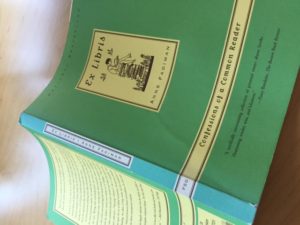Our book, Impact: The Lives of Women After Concussion has received funding from two sources: the first is St. Michael’s Hospital and the second is the Canada Council for the Arts. I had the great good fortune of distributing the Canada Council funds to our contributors today. We (E.D. Morin and I, and all of our contributors) are so grateful to the Canada Council for the Arts for supporting our work and enabling us to pay creators.
It is hard to overstate how difficult it is for writers to get paid these days. This could be a whole post in and of itself. But let’s stick to anthologies. Here’s something most people don’t realize: typically with anthologies, contributors don’t get paid. Royalties can be shared among contributors, but the math doesn’t make it worthwhile. So the editor gets paid royalties by the publisher and the rest do not.
How much money are we (not) talking about?
I don’t want to brag or anything, but E.D. Morin and I split just over $1000 in royalties for the last anthology we did together, Writing Menopause. I know. You’re underwhelmed. Remember, that represents several YEARS of work. We had over fifty contributors for that book. I give you the numbers so you see the problem. We can’t blame publishers for not wanting to get into this level of paperwork for such small sums. What happens instead is that most writers get paid in copies of the book. Two is typical. Three or more is considered a good deal. It’s better than nothing. But we all know, we can’t trade our books for groceries at the local market.
So when E.D. Morin and I started work on this anthology, we vowed we would find money somewhere to pay the writers. And the quest began. Databases were searched. We consulted with colleagues like Rona Altrows who is on a similar quest to pay anthology contributors and has been successful.
We were turned down by lots of people. It’s hard to get a grant without an organization behind you. There is a process of proving oneself (over and over again) that is difficult and sometimes even demoralizing. It’s the same as looking for a job, and maybe not quite as bad as looking for a bathing suit. At least I didn’t have to do it half-naked and in bad lighting. Anyway, we had to have a lot of stamina. But we get it. There’s no free lunch and anyone giving money out has to know that we can follow through and deliver on our promises. Our success on our last anthology (earnings notwithstanding) helped us to find funding with this project. We had a track record.
And then we found success. First, because of the content of the anthology, we got interest from St. Michael’s Hospital, who have a wonderful and renowned head injury clinic in Toronto and are an important centre for research. They recognized that our contributors were breaking new ground and as a result, they created a research project based on our anthology. And, as part of their funding, they included money to pay our writers as participants in the project. To know that our anthology will impact (pun intended) the treatment of women with concussion is an incredibly positive outcome and we thank, in particular, Dr. Shree Bhalerao and his team for their enthusiasm and support.
Then came the Canada Council for the Arts. Their grant officer was so helpful as I navigated their forms and process. Remember, I’ve got a concussion too, and about the hardest thing for me to do is use websites and fill in forms. When we received notification that the grant had been approved and awarded, we felt not only relief about being able to offer our writers a significant payment, but also gratitude for the recognition that what we are doing has artistic and literary merit. Thank you, Canada Council for the Arts.

It’s not easy, but it can be done. Writers must be paid. Not every project is this content specific. We had avenues of funding that were unique to us and would not be available to others. But we thought about our project in new ways to get where we are today. In the hard times ahead, we are going to have to be even more dedicated to supporting creators.
We can’t wait to share the results of this work with you.

